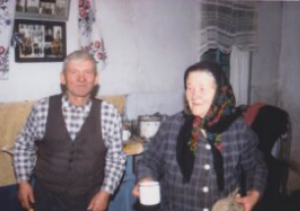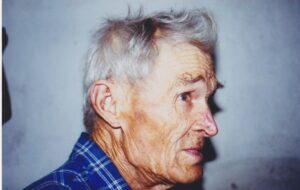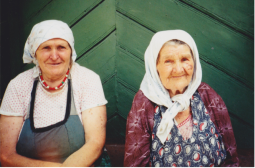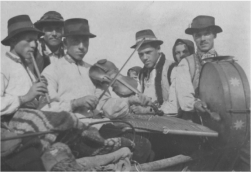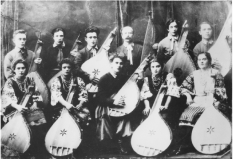—What year was your older sister born?
Sofia Ivanivna: 1907. She and her husband split up. When they started setting up the kolhospy, he submitted a request to join, but she didn’t want to. She said, “I won’t obey the devil. I would not then be a free kozachka [Cossack woman].” And he left her.
………………………………………………………………………………………..
—Why was your father taken?
Sofia Ivanivna: He was a guardian.
—What does that mean?
Sofia Ivanivna: He served in the tsar’s police. He was a hero. He had awards: two gold crosses, two silver ones, a gold medal, and the Cross of St. George. All his awards were taken. He was arrested in 1938, on St. Yevdokia’s day. He survived the Civil War and World War I. He used to say that he got so tired of war; he took a German [as a captive?]; he was very brave. They were arrested and not even allowed to change. Next day, I brought him some new clothes. I used to visit him often, but they didn’t allow any food, not a piece of bread. During the last visit, we kissed through the metal bars; his head was bandaged. People saw him being transported on the main road, and we haven’t seen him since.
………………………………………………………………………………………..
—What did your father have when you were still a child?
Sofia Ivanivna: Seven desiatyny of land in the hayfield and two hectares of a garden. We were not rich, but we were hated a great deal.
—What were you called: bidniaky, seredniaky, or the rich?
Sofia Ivanivna: Seredniaky. We had a cow that was confiscated in 1929. We had a horse too; our garden was taken, but the land remained in our possession. My father went and bought another horse, and it was taken away, too. They took everything and even wrote that we had a thresher which we didn’t have. He wanted to join the navy, but they wrote in his file that he exploited others’ labor, so his military application was refused.
—Did your father join the kolhosp?
Sofia Ivanivna: He submitted an application but it was not accepted; his voting rights were taken away.
—Your mother didn’t join the kolhosp either?
Sofia Ivanivna: No one joined. All the older relatives left; I was the youngest who stayed home. Then a document from Moscow came stating that my father was unlawfully accused and that he was released. We waited for his return, but no one came. My older sister went to Cherkasy to ask where he was and was told that he died of heart disease. At that time, a sentence of execution was replaced with twenty years of prison.
—Did all people in your village join the kolhosp?
Sofia Ivanivna: Not all of them. An old man named Roman Lukich didn’t join (he’s dead now); our family didn’t join; neither did a woman kozachka.
………………………………………………………………………………………..
—When the kolhosp was set up, how often were the meetings held?
Sofia Ivanivna: Often. There were both general and brigade meetings. A person who didn’t want to join the kolhosp was summoned to the staff office. The authorities locked the door to the room and harassed that person. It was horrible.
………………………………………………………………………………………..
—What did people say about those who did not join the kolhosp?
Sofia Ivanivna: They said they were lazy. I was thirty years old and I started making money with my embroidery.
—Was this a guild?
Sofia Ivanivna: There was a guild in Zolotonosha. Here we used to have a brigade chief, a woman who used to bring the sewing goods and products. I used to embroider up until the beginning of the war.
………………………………………………………………………………………..
—How much were you paid for the shirt?
Sofia Ivanivna: Twelve rubles for a shirt and seventeen for a dress. I used to make over one hundred rubles a month.
………………………………………………………………………………………..
—Where in your village did people gather for dosvitky?
Sofia Ivanivna: I used to invite the girls to my house.
—Did you pay for the house where you used to gather?
Ivan Mykhailovych: No.
—Did you have to bring something to eat?
Ivan Mykhailovych: There was one girl to whose house boys and girls used to go for dosvitky. Five or six girls would be there sewing the state orders.
—Did the girls use to gather to work during the day?
Sofia Ivanivna: Yes, some used to come to our house. My mother didn’t like when the girls gathered in the evening. She used to give us half a liter of kerosene and send us off to my grandmother. During the day, girls would gather in the garden of our house. Our house stood apart from the village, near the swamp and the woods.
—What was the party called when the girls gathered during the day?
Sofia Ivanivna: Shvachky [sewing].
—Did dosvitky take place throughout the year?
Sofia Ivanivna: They were held in the winter.
—When would dosvitky start?
Sofia Ivanivna: They would start with the first frosts, after the Intercession of the Theotokos.
—When would dosvitky normally end?
Sofia Ivanivna: Around a week before Lent because it was considered sinful to sing during this time and dosvitky were ending.
—What musicians took part in dosvitky?
Sofia Ivanivna: There were no musicians.
………………………………………………………………………………………..
—When you sang on the streets, who would lead?
Sofia Ivanivna: The girl that had a higher voice [soprano].
—What neighborhood [kutok] had the best singers in your village?
Sofia Ivanivna: Dibrova.
—What were the names of the other neighborhoods?
Sofia Ivanivna: Stryzhena, Shchipakivka, and Pidhora.
—Did girls and guys come from the other neighborhood?
Sofia Ivanivna: Guys used to come to see the girls.
